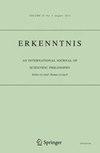Logical Instrumentalism and Anti-exceptionalism about Logic
IF 0.8
2区 哲学
0 PHILOSOPHY
引用次数: 0
Abstract
Abstract This paper critically examines logical instrumentalism as it has been put forth recently in the anti-exceptionalism about logic debate. I will argue that if one wishes to uphold the claim that logic is significantly similar to science, as the anti-exceptionalists have it, then logical instrumentalism cannot be what previous authors have taken it to be. The reason for this, I will argue, is that as the position currently stands, first, it reduces to a trivial claim about the instrumental value of logical systems, and second, by its denial that logic aims to account for extra-systemic phenomena it significantly differs from science, in contrast with the AEL agenda. I will conclude by proposing a different kind of logical instrumentalism that I take to have a broad appeal, but especially for anti-exceptionalists, for it is developed as analogous to—and thus much closer aligned with—scientific instrumentalism.逻辑的工具主义与反例外论
摘要本文对近年来在反例外论的逻辑论争中提出的逻辑工具主义进行了批判性的考察。我要说的是,如果一个人希望支持逻辑与科学非常相似的说法,就像反例外论者所认为的那样,那么逻辑工具主义就不可能是以前的作者所认为的那样。我认为,其原因在于,就目前的立场而言,首先,它简化为一个关于逻辑系统的工具价值的琐碎主张,其次,通过否认逻辑旨在解释系统外现象,它与科学有很大的不同,与AEL议程相反。最后,我将提出一种不同的逻辑工具主义,我认为它具有广泛的吸引力,尤其是对反例外论者来说,因为它的发展类似于科学工具主义,因此更接近于科学工具主义。
本文章由计算机程序翻译,如有差异,请以英文原文为准。
求助全文
约1分钟内获得全文
求助全文
来源期刊

ERKENNTNIS
PHILOSOPHY-
CiteScore
2.10
自引率
11.10%
发文量
116
期刊介绍:
Erkenntnis is a philosophical journal publishing papers committed in one way or another to the philosophical attitude which is signified by the label ''scientific philosophy''. It concentrates on those philosophical fields which are particularly inspired by this attitude, although other topics are welcome as well. These fields are:- Epistemology - Philosophy of science, foundations and methodology of science in general and of natural and human sciences such as physics, biology, psychology, economics, social sciences in particular - Philosophy of mathematics - Logic, philosophy of logic, and all kinds of philosophical logics - Philosophy of language - Ontology, metaphysics, theory of modality - Philosophical psychology, philosophy of mind, neurophilosophy - Practical philosophy, i.e. ethics, philosophy of action, philosophy of law, etc. One of the objectives of Erkenntnis is the provision of a suitable platform for the discussion of controversial issues; another is the provision of timely, competent reviews of important publications in an ever-growing field of research.In recent years, philosophers standing quite outside the pale of analytic philosophy have also paid careful, and indeed most welcome, attention to precision of concept and language, to arguments, and to well-grounded foundations. Erkenntnis provides for them, and for philosophers of all persuasions, a place of meeting, of discussion, and of disputation.Erkenntnis was originally founded in 1930 by Rudolf Carnap and Hans Reichenbach, it was revived in 1975 by Carl G. Hempel, Wolfang Stegmüller, and Wilhelm K. Essler. You can find more information about this in the article “Hempel: The old and the new ‘Erkenntnis’” accessible in the tabs to the right.Today, Erkenntnis is one of the leading journals in philosophy worldwide and attracts first-class authors at all stages of career; from young philosophers at the PhD level up to established academic philosophers and highly renowned senior scholars. We pride ourselves on supplying our authors with substantial referee reports, subject to a turnaround time of about three months until the first decision. The acceptance rate for publications in the journal is presently slightly below 10%.
 求助内容:
求助内容: 应助结果提醒方式:
应助结果提醒方式:


